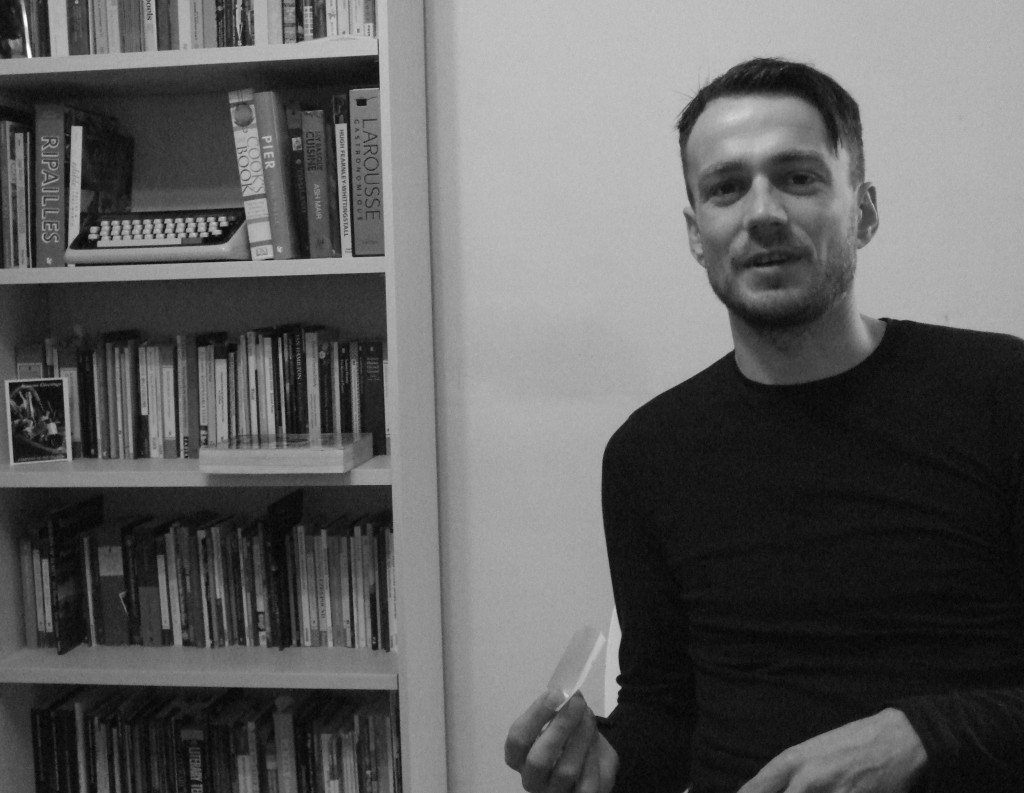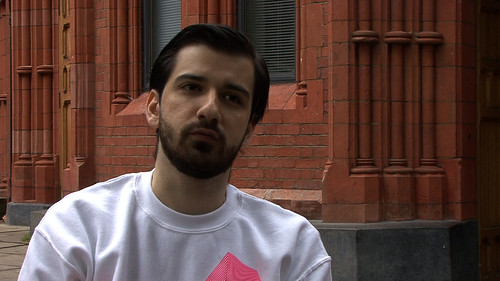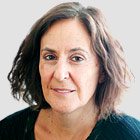Get the feel – it feels like spite

The Walajah wall running through Jerusalem, ensuring Palestinians are separated from Jews.Photo by Oren Ziv / Activestills.
Jerusalem: Uprooted, Walled Out & Cut Off
Video from Palfest, Palestinian Festival of Literature; click headline above to watch and listen, 9.25 mins.
May 05, 2014
In this video, powerful in its simplicity. British writers are taken on a tour of Jerusalem by Fayrouz Sharqawi of Grassroots Jerusalem*. Here are some snippets of their recorded comments:
Tom Warner, poet: “What does take your breath away is that there’s a … juridicalised cruelty which really does take your breath away”. “There’s nothing accidental about the way these checkpoints work on your spirit. These things are well thought out. They are intended to humiliate, they are intended to dehumanise.” “Until you’ve experienced it you don’t really understand the mechanism and apparatus in place.”

Omar al-Khairy: “a plethora of laws and by-laws and a contradictory type of pick-and-mix approach to the law”. Al-Khairy is the 2013 Leverhulme Associate Playwright at the Bush Theatre and has previously collaborated with the Royal Court, the Soho Theatre, Theatre 503, the Arcola, the Lyric and Old Vic New Voices . His plays include Burst, Sour Lips commissioned as part of the Counter-Culture season at Ovalhouse and Given the Times.

PalFest Previews: Omar al-Khairy on a Chance to Connect and Collaborate ‘Outernationally’
By MLYNXQUALEY
May 18, 2013
This will be playwright Omar El-Khairy’s first trip with the Palestine Festival of Literature. His most recent theater production, Sour Lips, was reviewed on ArabLit earlier this year; he’s also a filmmaker, at work on Tunnels, a “somewhat Beckettian film about a young boy from Gaza who meets an old man at a bus stop in this suspended world – somewhere between Gaza and London.” ArabLit & Omar El-Khairy had a brief email interview:
This is your first time at PalFest, yes? Why did you decide to go?
Omar El-Khairy: It is, yes. Well, I’ve watched PalFest grow over the years and have long admired the vision, determination and energy of all those involved. At a time when the idea of cultural exchange has either been totally consumed by today’s international culture industries or co-opted by states and institutions as a tool of cultural diplomacy, PalFest is a rare opportunity to connect and collaborate outernationally with fellow artists.
Moreover, the decision this year to reject stubbornly the border crossings, checkpoints, barriers and walls that cut up the land, and instead to imagine and help create an environment in which culture can roam all over historical Palestine is a really exciting prospect.
What are you hoping comes of it, both for you & for audiences?
OK: The last time I was in Palestine was over three years ago for my PhD fieldwork. So, to return on different and somewhat freer terms wherein Palestine isn’t simply a research site is exciting for me.
I don’t really have any predetermined ideas of what I hope to bring or take from my time there. I simply hope to connect, share with, learn from and hopefully build collaborations with fellow artists.
Are you making connections with theatre/film people while you’re there? Are there things happening in the Palestinian theatre/film world that are particularly exciting?
OK: I hope to, yes. On the last occasion that I was there, I was fortunate enough to spend some time with both the Freedom Theatre in Jenin and Idioms Film in Ramallah. There’s a real burgeoning collective of confident Palestinian artists who, while both recognising and accepting the historical burdens placed upon them, are also trying to find ways of responding to the particularities of both the present-day and quotidian.
Your film, Tunnels, is currently in post-production. Can you say a little about that film, when/where it will be released? What was its inspiration/how did you go about creating it?
OK: Yes – I recently saw a first (very) rough cut of it. The idea for the film developed over a long period of time – more like two fairly rapid bursts over the course of a few years. The first was when I was fortunate enough to meet the film’s eventual director Mohanad Yaqubi. We just hung out, got to know each other and talked about a number of things – our loves and frustrations, our hopes and aborted dreams. The following year Mohanad spent some time in London for his MA and we got to talking about collaborating on a short together. Mohanad had a rough idea of what he wanted to explore – how Palestinians are always waiting – at checkpoints, for visas, for utilities, for family members, for their homeland. So, that was the starting point for our somewhat Beckettian film about a young boy from Gaza who meets an old man at a bus stop in this suspended world – somewhere between Gaza and London.
I plan to spend some time with Mohanad while I’m out in Palestine and get closer to completing the film.

Gillian Slovo, writer of fiction and autobiography and political veteran with a sharp eye for how police authorities work, says: the security officer was busy on her mobile phone showing:”They don’t think there’s really a security situation going on. What they are doing is putting people in their place and stopping the free movement of a whole people.”
Amongst her many published works are Morbid Symptoms (1984), Death by Analysis (1986), The Betrayal (1991), Close Call (1995). Every secret thing : my family, my country (1997), Red Dust (2000). Ice Road (2004

Chiana (China) Mieveille is a powerful speaker in this video. Chiana is an English fantasy fiction author, comic writer and academic. He is fond of describing his fiction as “weird fiction”. Formerly an SWP member, he became a founding member of Left Unity in 2013. He teaches creative writing at Warwick University, and in 2012–13 he was Writer-in-Residence at Roosevelt University in Chicago, Illinois.
Among his comments: “All these intriguing little details which add a sort of juridical cruelty to it which really does take your breath away.” The many rules constitute a “clear intention to fragment and dislocate.”
Ray Dolphin from OCHA attempts to explain the rules which keep Jerusalem Arab-free including by keeping married couples apart.
Authors and artists attending the 2013 Palestine Festival of Literature were taken around Jerusalem, where they saw the multiple techniques being employed to ethnically cleanse the city. They crossed into the city through Qalandia checkpoint and met with people in the Old City, Sheikh Jarrah and smaller, surrounding neighbourhoods. This is what they saw.
Interviews
China Miéville, Gillian Slovo, Tom Warner, Omar el Khairy
* Grassroots Jerusalem
About
Grassroots Jerusalem is a platform for active social, urban and human rights activists and organizations in Al-Quds.We seek to create a strong grassroots network that will represent community voices who disobey, oppose and resist the occupation.
We amplify the local resources available for and from grassroots activists, leaders and organizations. We create virtual and real environments for meeting, sharing information, educating, growing and coordinating on shared issues of urget and long term concern.
